Best Commercial Pressure Washers 2021 – Reviews & Buyer’s Guide
Last Updated on December 17, 2021 by Mark Johnson
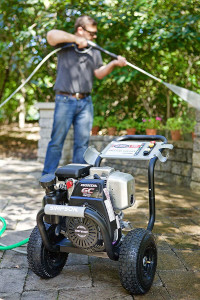
Buying a commercial pressure washer can feel like a high-pressure situation, but the fact of the matter is that you can get a great cleaning experience without throwing yourself under the bus. Shopping online for these tools can feel like an impossible task since manufacturers are all too happy to tell you everything about their model that’s great while covering up any potential problems.
We want to make shopping online easy again, and we believe that a well-informed buyer can find the right model. That’s why we’ve created these reviews of the best commercial pressure washers of 2020.
You should be able to use this list to find the model that’s right for you, and if you have no idea how to go about doing that process, be sure to check out our buyer’s guide. We’ve packed it full of great general information about these machines, as well as some tips on getting the best value for the money.
Comparison of our Favorite Washers of 2021:
| Model | Price | Weight | Editor Rating |
|---|---|---|---|
DEWALT 4200 PSI DXPW4240 Gas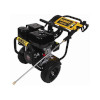 (Top Pick) | Check Price | 141 lbs | 4.3/5 |
Generac 6565 4,200 PSI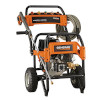 | Check Price | 147 lbs | 4.0/5 |
PowerBoss 20649 Gas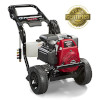 (Best for the Money) | Check Price | 62 lbs | 3.8/5 |
SIMPSON MSH3125-S MegaShot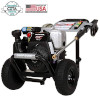 | Check Price | 65 lbs | 3.7/5 |
Briggs & Stratton Gas 020507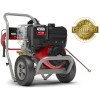 | Check Price | 142 lbs | 3.2/5 |
5 Best Commercial Pressure Washers Reviewed:
1. DEWALT 4200 PSI DXPW4240 Gas – Top Pick
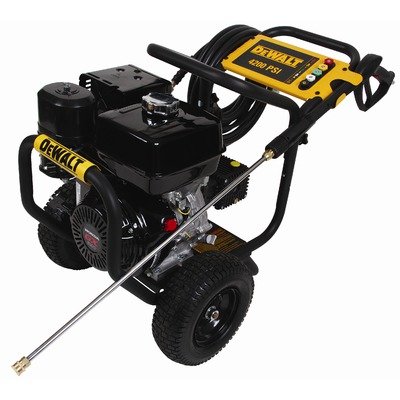
The DEWALT 4200 PSI DXPW4240 Gas pressure washer is the model you want if you have a lot of jobs you need done quickly and with excellent power. The 4200 PSI of washing pressure included in this model is about the most you’ll find on the market, period, making it a great choice for those with the most demanding washing needs. It also comes with five quick-connect nozzles. Those allow you to customize this machine’s great power to the task at hand, and handle surfaces that need a thorough cleaning and a gentle touch without changing machines.
This model includes a cart with 13-inch tires. Those are large enough to roll over hoses and other obstacles that might get in the way and are large enough to tackle curbs as well. It also comes with a great Honda engine, which tends to start on the first pull. While a small percentage of units are duds right out of the box, the vast majority work so well that it would be a travesty to put this model anywhere other than first place on our list. If you have big cleaning needs, this is the machine that will make your job easy.
- 4200 PSI
- Five quick-connect nozzles
- Starts on first pull
- Large tires
- Small quality control problems
2. Generac 6565 4,200 PSI – The Runner-Up
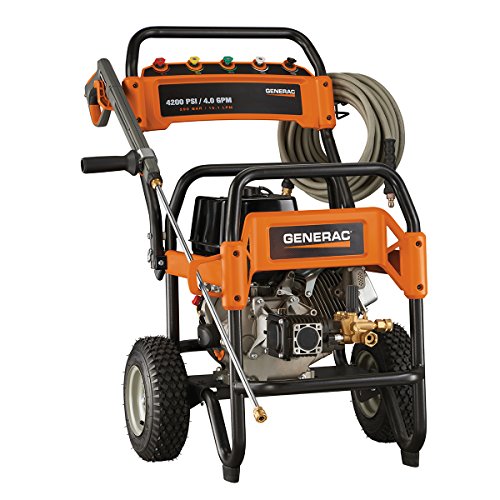
The Generac 6565 4,200 PSI is another model to consider if you need industry-leading power. It comes with 4,200 PSI, which puts it on par with the top model on our list. It also includes five quick-connect nozzles. Those nozzles make getting the right pressure and spread for the job a quick and easy task. This model comes with an excellent pump. Billed as a “triplex” pump, the manufacturer estimates that it will last four times as long as the axial cam pumps that most pressure washers use. That’s good news, as the pumps are usually the first part to die in a pressure washer, so any steps taken to extend their life adds a lot of value to the machine.
It also includes a 50-foot hose, so you’ll be able to work in a large area without moving the base around. That will save you a lot of time in the long run and give you more freedom to work without interruption. Unfortunately, its engine doesn’t start as easily as some of the others on our list, which costs this model first place. However, this model will still satisfy most people, though you can get better value elsewhere.
- Great power
- Durable pump
- Five quick-connect nozzles
- 50-foot hose
- Starting problems
3. PowerBoss 20649 Gas – Best for the Money
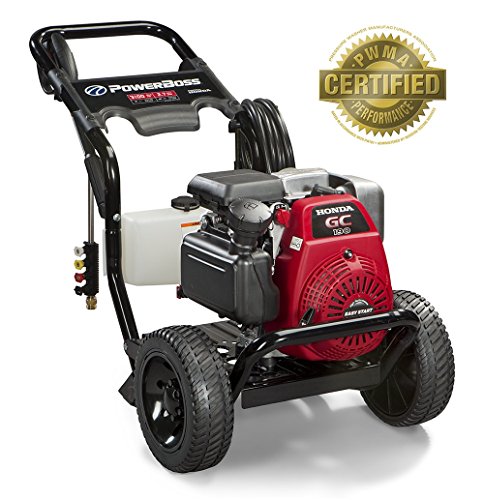
If you’re attracted to the power, you get from the first two models, but don’t want to pay through the roof to get great performance, the PowerBoss 20649 Gas-powered pressure washer may be the model for you. It comes with four nozzles, which gives you a wide variety of options for approaching your cleaning jobs. It also includes a large, one-gallon detergent tank. You can apply as much soap as you want before you clean, making tricky jobs far easier. The engine is Honda-made, and like most Honda engines, it almost always starts on the first pull, so you won’t waste any time getting this machine going.
It also costs a fraction of what you’ll spend on the top two models on our list, so you’re getting a great deal when you buy this model. In fact, it’s so good that this model takes the title of “best value for the money” on our list. The only downside is that it comes with a 25-foot hose. That’s on the short side, though it’s something you should be able to upgrade on the aftermarket. Overall, this is the best choice for cost-conscious buyers who need a lot of power, too.
- Four nozzles
- One-gallon detergent tank
- Easy start
- Great price
- Short hose
4. SIMPSON MSH3125-S MegaShot
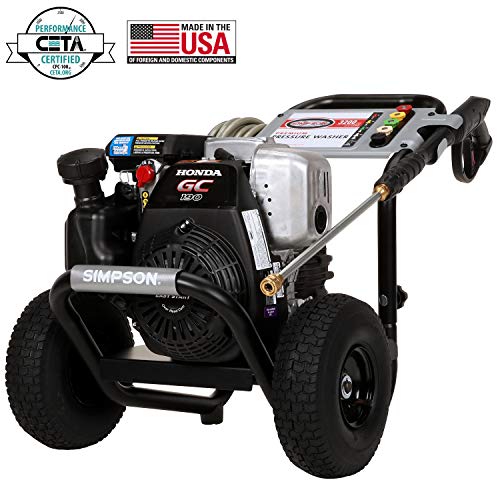
The SIMPSON MSH3125-S MegaShot’s price is going to draw a lot of people to it. However, even though it often runs cheaper than the best value model on our list, it has some problems that mean it delivers far less value, even though it’s a hair cheaper. It comes with 3,200 PSI, which is more than enough to get most tasks done quickly. It also includes five quick-connect nozzles, which puts it on par with the best models in that area.
However, it only comes with a 25-foot hose. That’s going to limit what you can do with this model unless you spend money to upgrade the hose. That offsets the low price to some extent. There’s also a persistent problem with quality control with this model. They often ship missing parts, which leads to frustrating calls with customer support. They also have a high rate of random breakdowns, which are usually resolved under warranty but are a pain to deal with. Since the breakdowns happen in different areas, there’s little you can do to prevent them. Overall, you can get this model cheaply, but you might find that you want to spend more for a less frustrating experience.
- Low price
- Decent power
- Five quick-connect nozzles
- Short hose
- Quality control issues
5. Briggs & Stratton Gas 020507
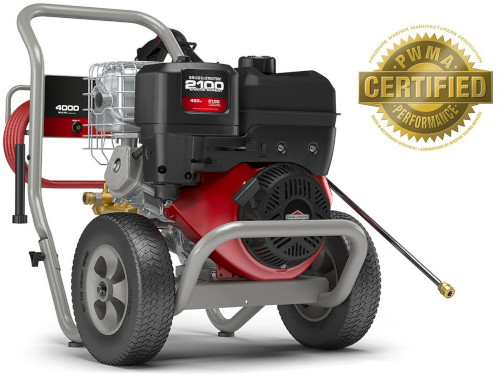
The Briggs & Stratton Gas 020507 is not the cheapest model on our list, and with the price tag that it carries, you would expect it to be a higher performing model than it actually is. The good news is that it provides excellent pressure, at 4,000 PSI, which can get the worst jobs done in record time. It also comes with five quick-connect tips. Those allow you to use that tremendous pressure to its maximum extent, or to go with a gentler flow for more sensitive surfaces. It also includes a 50-foot hose, which is long, and good news since so many other models fall short in that area.
However, this model suffers from multiple quality-control issues that hurt its value. The model is poorly-shipped, so it often takes damage in transit. The tightening process is often done only halfway at the factory, which leads to tremendous oil leaks in transit. That leaves you unable to tell if it has a broken part, or just needs a good tightening. Overall, it doesn’t make a lot of sense to invest in a model that might have severe leaks and damage during shipping, especially when you’re paying this much for it.
- Good pressure
- Five quick-connect tips
- 50-foot hose
- Poor quality control
- Oil leak problems
- Bad shipping
Buyer’s Guide
Hopefully, our reviews have already given you some insights into pressure washers and how to find good value when shopping for them. We know that it doesn’t always feel easy to shop online, especially when it’s your first time shopping for an item. If that’s the case, be sure to check out this buyer’s guide. We’ve filled it with all the information you need to know in order to make a well-informed decision. It’s also a great resource to consult if you’re looking to learn about what’s new on the market, or just want to make sure that you get great value for your money when you buy.
Nozzles
One of the most important differences between models, other than how well they work, is what nozzles they come with. In order to make sure that you’re getting the right model for your situation, it’s important to understand what each nozzle does, so that you can get a model that comes with the types that you’ll use.
Zero-degree
The zero-degree nozzle is one of the most powerful nozzles that you’ll find on the market today. The degree on each kind of nozzle refers to how much the water is spread out by the nozzle. Thus, the zero-degree nozzle spreads the water out as little as possible and results in the most concentrated and most intense stream.
You’ll use this nozzle when you need to clean very tough materials off very tough surfaces. If you’re looking to take paint off a concrete wall, then this should be your go-to nozzle. You probably don’t want to use this model on a fence or surface with paint that you want to keep. It will probably take paint or varnish right off, and with commercial-power pressure washers, you might also split the wood.
15-degree
15-degree nozzles spread the water out to about a 15-degree arc. That means they don’t hit as hard as the zero-degree nozzle, but still provide excellent cleaning power. You could use these to take the varnish off of a fence without worrying about damaging the underlying wood. They’re also a good option for when you need to clean a large area relatively quickly, but where the task will be very hard. With a zero-degree nozzle, that could take a long time, but with the 15-degree nozzle, you’ll be able to clear wider bands at once and get the job done more quickly.
25-degree
The 25-degree nozzle is the one that you’ll want to use if you’re cleaning a very large area. This nozzle is great for stripping mud off the side of a building, or for clearing mold or other tough dirt off a concrete surface. This is also a good nozzle for cleaning out truck beds or for cleaning off fences. It will provide a large cleaning area, and generally won’t take off paint or varnish when used on a wooden surface. This makes it a well-rounded cleaning nozzle, though you won’t be able to clean the toughest materials with this nozzle.
40-degree
The 40-degree nozzle spreads the water out the most of all the standard nozzles. If you need to clean cars or trucks, this is the nozzle that you’re going to want to use. It’s very unlikely to damage the paint, while also providing a large spread that allows you to get the job done quickly. If you’re cleaning tires or the undercarriage, you may upgrade to a narrower nozzle because you’re not going to be worried about stripping paint, and odds are that you have a tougher cleaning job there.
The 40-degree nozzle is also the best choice for light cleaning jobs. If you’re cleaning off the side of your house, or merely want to sweep leaves off of your sidewalk, the 40-degree nozzle is a good choice.
Soap dispenser
The soap dispenser, or applicator, is very important for situations where you’re going to be cleaning vehicles off. Since you can’t clean them off with the strongest nozzles, you may need some help getting the dirt and mud off them. On commercial models, the soap applicator will draw soap from the onboard soap tank and use it to create a foamy solution which coats a vehicle or structure and allows you to easily wash grime away once you switch to a cleaning nozzle. Consequently, it’s a good idea to get a model that comes with one of these nozzles, especially if you’re going to be washing vehicles.
Power
Power is the reason that you’re getting a commercial pressure washer. If it wasn’t important, you could easily downgrade to a far less expensive model and still get the job done. So, it’s important to make sure that you’re getting the power you need to get your job done.
Commercial pressure washers come in one of two power clusters. The first is the cluster around 3,000 PSI. Models with this amount of pressure will be able to clean about anything. They also generally have lower power requirements, so they’ll often use smaller engines and less fuel, saving you money in the long run. The good news is that you should be able to complete all jobs that you want to do with a pressure washer of 3,000 PSI or more.
The next cluster starts at about 4,000 PSI. Models that put out this much pressure will have larger, less fuel-efficient engines, but they will have far more power. That doesn’t necessarily unlock new kinds of cleaning tasks, but it allows you to do the same jobs, with the same nozzles, far quicker.
Accessories (Hose, wheels, soap dispenser)
There are a few accessories that don’t directly attribute to performance but are important nonetheless.
First among these is the hose. On a commercial model, you’re going to want a hose that is at least 50 feet long. That means you can leave the base in one place and work for a long time without having to come back and reposition the base. That’s something you’ll appreciate since the bases can be very heavy.
Speaking of how much these models weigh, it’s a good idea to get one with great wheels. Larger wheels make traversing over small obstacles much easier, and you’re going to really want large wheels if you’re ever going to have to go over a curb with one of these machines.
Finally, the soap dispenser is another valuable addition to a pressure washer. If you’re ever going to be cleaning vehicles, then you’ll want a model with inline soap dispensing. That way, you’re always getting a little extra soap in the mix to make the process easier and can use the soap nozzle for the especially tough jobs.
Which commercial pressure washer is right for you?
Many people think about value wrong and start to fixate on the price. While getting a good price is an important part of getting good value, it can lead to getting a model that doesn’t have the features that you need to be satisfied.
The best way to get great value is to start by figuring out what kind of experience you want to have and what features will contribute most to that experience. Once you know that, make a short list of models that fit those requirements. Then, choose the cheapest model from that list. It has all the features that you need in order to have a great experience, and since it has the lowest price tag, it’s the best value for the money.
Conclusion
The DEWALT 4200 PSI DXPW4240 Gas pressure washer is our top model due to its large tires, great pressure, and easy starting. The Generac 6565 4,200 PSI comes with great power, a durable pump, and a 50-foot hose, but starting problems keep it out of first place. The PowerBoss 20649 Gas-powered pressure washer includes an easy start, a one-gallon soap tank, and four nozzles, and since you can get it at a great price, it’s the best model overall for the money. The SIMPSON MSH3125-S MegaShot comes at a low price, has decent power and five quick-connect nozzles, but a short hose and quality control issues drop it to fourth place on our list. The Briggs & Stratton Gas 020507 has good pressure and a 50-foot hose, but poor quality control and likely damage during shipping drop this model to last place on our list.
We hope that our reviews and buyer’s guide have helped you find the commercial pressure washer that is right for you.
